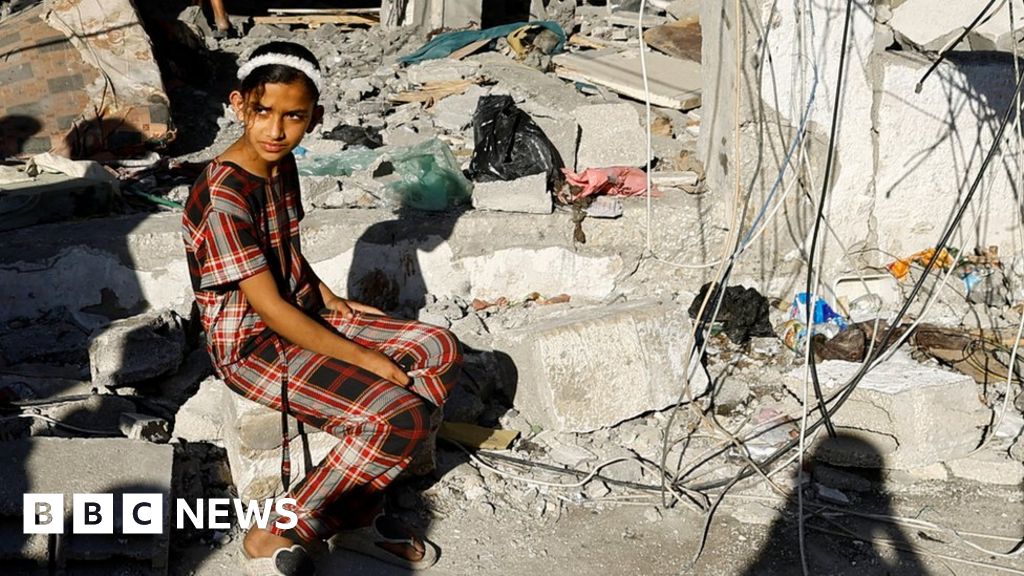- Written by Alex Therian and John Sudworth, New York.
- bbc news
U.S. officials have again raised concerns with Israeli officials about Israel's plans for a military operation in the southern Gaza city of Rafah.
The White House announced that representatives of the Israeli prime minister had agreed to “consider these concerns.”
The United States has repeatedly urged Israel not to launch a major offensive in Rafah to avoid increased civilian casualties in Gaza.
Separately, the US vetoed a UN resolution granting full member state status to the Palestinian state.
In another development, US Secretary of Defense Lloyd Austin called for a meeting with Israeli Defense Minister Yoav Gallant to “discuss regional threats and Iran's destabilizing actions in the Middle East.”
The two leaders also discussed “the importance of increasing and sustaining the flow of humanitarian aid to Gaza civilians, including through new routes from the Israeli port of Ashdod.”
The Israeli military said it had attacked dozens of targets in the Gaza Strip, a day after Israeli forces extensively bombed Gaza City in central and northern Gaza.
Qatar, which has played a key mediating role in ceasefire negotiations, earlier said ceasefire talks were stalled.
Israeli Prime Minister Benjamin Netanyahu has consistently vowed to carry out an offensive in Rafah, where more than 1 million Palestinians have taken refuge, as the next step in military action against Hamas.
The United States, Israel's closest ally, is pressuring Israel to avoid a large-scale attack in Rafah and take a more targeted approach.
The war in Gaza broke out on October 7, when armed groups led by Hamas carried out an unprecedented attack on southern Israel, killing about 1,200 people, mainly civilians, and leaving 253 dead. were taken back to Gaza as hostages.
At least 33,970 people have been killed in Gaza since then, the majority of them women and children, according to the Hamas-run health ministry. During an Israeli military operation to destroy Hamas and free hostages.
Rafah was the focus of the discussion, along with Iran's unprecedented drone and missile attack on Israel last week, according to a White House reading of Thursday's meeting.
“The two countries agreed on a common goal of defeating Hamas in Rafah. U.S. participants expressed concern about different courses of action in Rafah,” the statement said.
The experts agreed to hold follow-up consultations and said they would meet again soon.
Israel did not immediately comment on Thursday's meeting, which followed similar talks on April 1.
At the time, U.S. officials told the Israelis that plans for Rafah were inadequate to evacuate and protect Palestinian civilians who had been forced to flee their homes and were taking shelter there.
A resolution granting the Palestinian state full UN membership status was vetoed by the United States at a Security Council meeting.
The Palestinian Authority has been an observer since 2012, but cannot vote on the proceedings.
Twelve countries, including France, Japan and South Korea, voted in favor of the resolution, but only the United States voted against it, with two abstentions from the United Kingdom and Switzerland.
This was a unilateral move that the United States would like to avoid if possible, and there were reports that there was intense lobbying behind the scenes before the vote in hopes of wooing other Security Council members to its side. .
U.S. Deputy Ambassador Robert Wood explains the Palestinian veto, saying the U.S. remains a strong supporter of a two-state solution, but that changes to the Palestinian state's status at the United Nations will only occur as part of a negotiated solution with Israel. argued that it should. .
Riyad Mansour, the UN special envoy for Palestine, said the Palestinian people have the right to self-determination.
“The Palestinian people will not disappear,” he added. “We will not disappear. The Palestinian people will not be buried. It is a historical fact. No amount of power, no amount of oppression, can erase history.”
Israel's UN special envoy Gilad Erdan thanked the United States for “standing up for truth and morality in the face of hypocrisy and politics” and called on other countries to support a resolution to “repay Palestinian terrorism with a Palestinian state.” denounced.
Russian envoy Vasily Nebenzha said the United States had “demonstrated its true attitude toward the Palestinians.” He added: “For Washington, they do not deserve a state of their own. They are only an obstacle to the realization of Israel's interests.”
British Special Envoy Barbara Woodward said: “We believe that such recognition of a Palestinian state should not occur at the start of a new process, but it does not have to be at the end of the process. We have to start with solutions.” Imminent crisis in Gaza. ”


